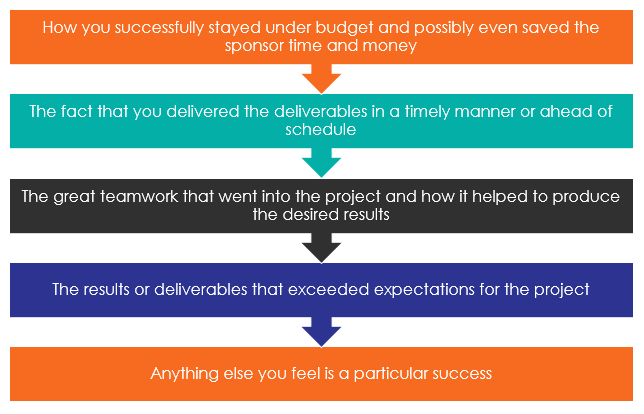Welcome to
Project Management broken downStarting your project out right
Module Five
Project Review and Closure Activities

What is important at the closure stage of a project is to deliver results to your project sponsor. In this module, we’ll look at how to plan your review and closure activities in a way that produces satisfying results and helps you improve on future projects. Like the other processes you’ve worked through already, in this chapter you’ll create a repeatable process you can use for future projects.
Communications at the Closure Stage
Good communication is just as crucial in the last stage as in all stages that came before. For each deliverable, you’ll need approval from the project sponsor.
A great way to reflect on the project and boost team morale is to celebrate the successes of each deliverable. Host a small party for your team members with pizza, sweets, or coffee and create a presentation that highlights key moments in the process. Use the presentation to drive home the success of the project and what, in particular, made it successful.
Closing the Project
After all of the deliverables are completed and approved, you need to officially close the project. Recognize team members for their contributions and thank them for their hard work. Let everyone know that the project is officially finished.
An important part of this process is to contact the project sponsor by phone or in person to get their sign off. Walk through the final stages of the project and all of the deliverables with them to make sure they’re satisfied with the project’s results.
This is a good time to highlight with the sponsor as well the successes of the project. Some things you might want to stress to the sponsor include:
- How you successfully stayed under budget and possibly even saved the sponsor time and money
- The fact that you delivered the deliverables in a timely manner or ahead of schedule
- The great teamwork that went into the project and how it helped to produce the desired results
- The results or deliverables that exceeded expectations for the project
- Anything else you feel is a particular success

Naturally, as you go over the project details with the sponsor, you should avoid mentioning anything that went wrong, unless it showcases how you turned the problem around and achieved greater success because of it. If the project’s failures are mentioned, downplay them and explain to the sponsor briefly how you learned from them.
This process isn’t just to encourage more similar projects from the sponsor in the future, but also a way to reflect yourself on the successes of the project.
Getting Feedback
As part of this process, you also need feedback from the sponsor. Verify with them their level of satisfaction with the final deliverable. Find out if there are any areas where they are not satisfied. Your goal is to continue to engage with this client for future work as well as referrals and other opportunities in the future.
Example 1:
You may find that the client was unhappy with a format used for the deliverables. Possibly, this is a tiny detail that was left out of the initial project planning. If this is the case, you would want to ensure that you include in the pre-project planning exactly what format you will use for deliverables.
Example 2:
Another example is that you may find that the client was particularly pleased that the work was finished early. This may have exceeded their expectations a great deal and enabled them to move forward in their work, thus earning them more gains. If this is the case, you may want to push back deadlines on future projects and create this same “wow” moment for future clients. Exceeding expectations in a way such as this gets you more work and referrals.
Lessons Learned
A critical step that is often left out of this process is to re-cap and consider with your team what lessons you can learn from the project. Each project is a learning opportunity, especially when it’s the first project of its kind. Take time to reflect and consider what changes you could make to ensure the project is more successful next time.
It’s important to have the input of your team members. They may identify an important lesson that you hadn’t considered. If you undertake the project by yourself with no team, reflect by yourself and try to consider every aspect of the project.
Variables to consider when thinking of lessons learned include things like project time, cost, budget, and schedule. You should discuss and share these lessons learned in a meeting and consider drafting a document that outlines this feedback for each project.
Activity:
- Think back to some work you have previously completed. Can you think of some lessons learned that you could apply to your current project?
- In the past, how have you improved processes based on previous project successes or challenges? Where applicable, make any adjustments to your project plan to reflect any lessons learned that you might want to incorporate into your current project.
- Update your calendar to include important dates. As well, add in a follow up email reminder for 30 days out after the project closes to reach out to the project sponsor.
- Draft a sample of an email template that you can use as your follow up email.
A Word
From Tamara
As an entrepreneur myself I completely understand the stress, anxiety and frustration around launching or growing a business. I also know the rewards and life style change the hard work can provide you if you stay focused. I am here to inspire and motivate you to push forward. The fact that you’re investing in your business education let’s me know you’re in this to win. Rest assured I’m here to help you…. These courses are set up to help you understand the basics. To dig deeper into your specific plan of action we will discuss where you are, where you want to be, eliminate any blocks preventing you from getting to the next step and create an action plan.

Our superpower is making you a superhero.

